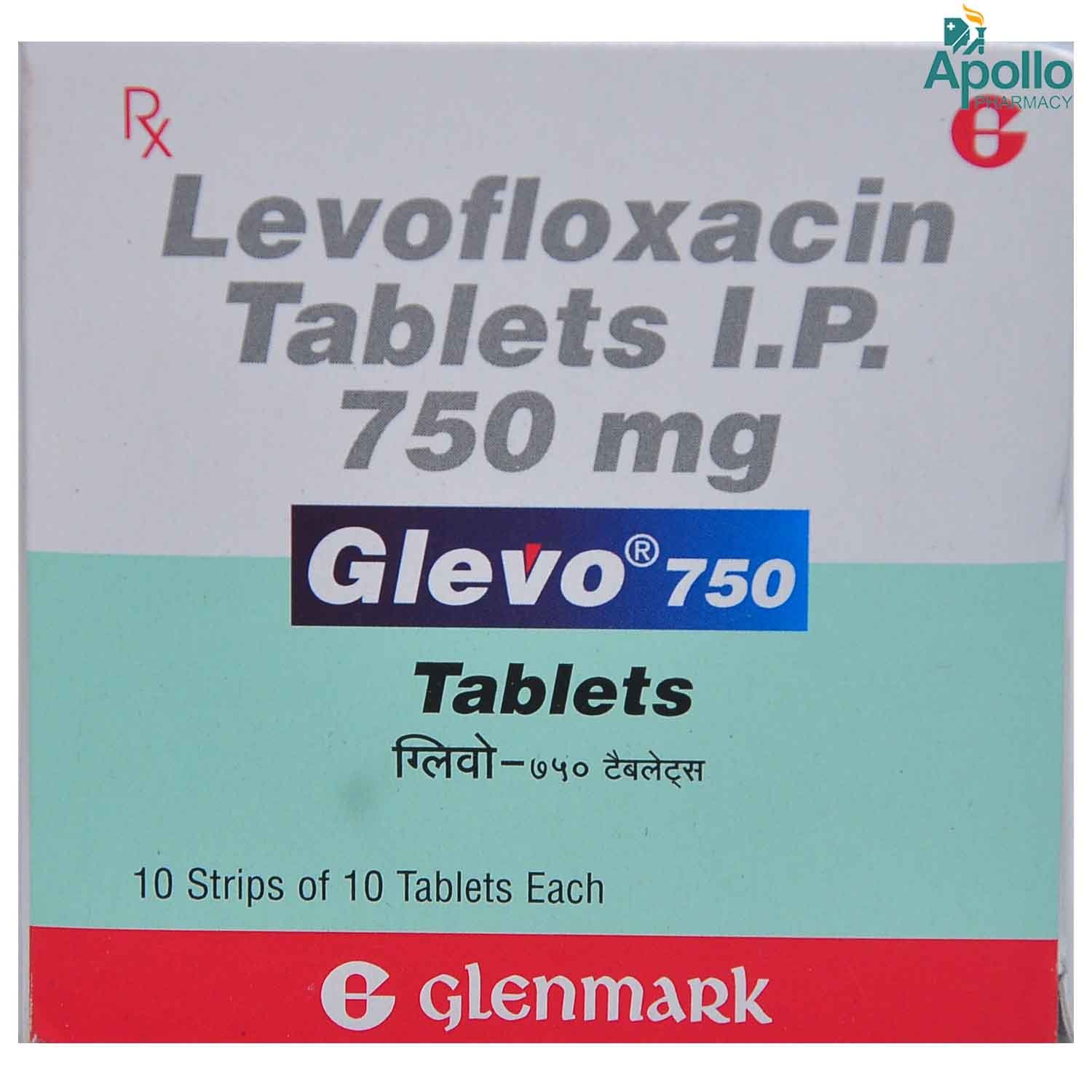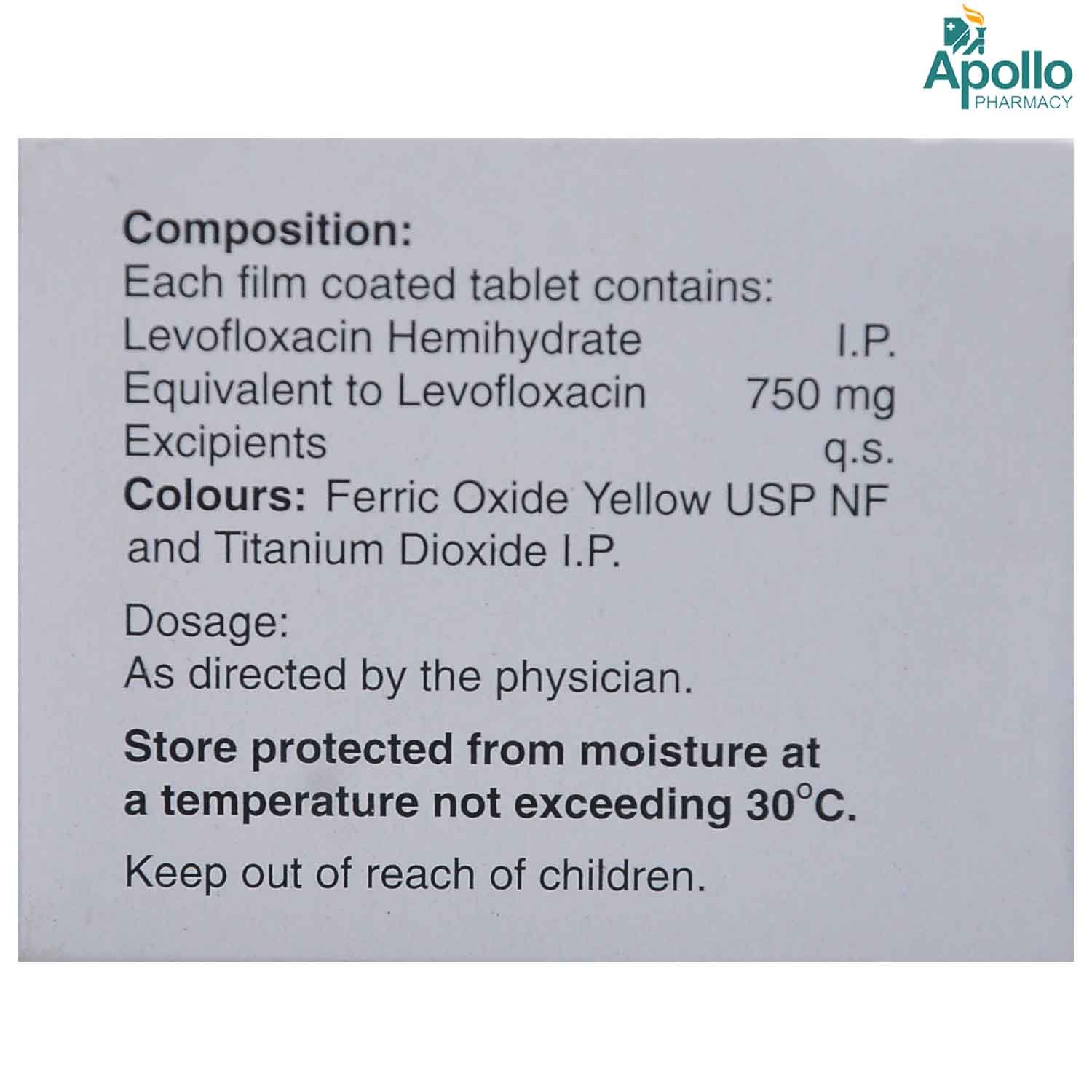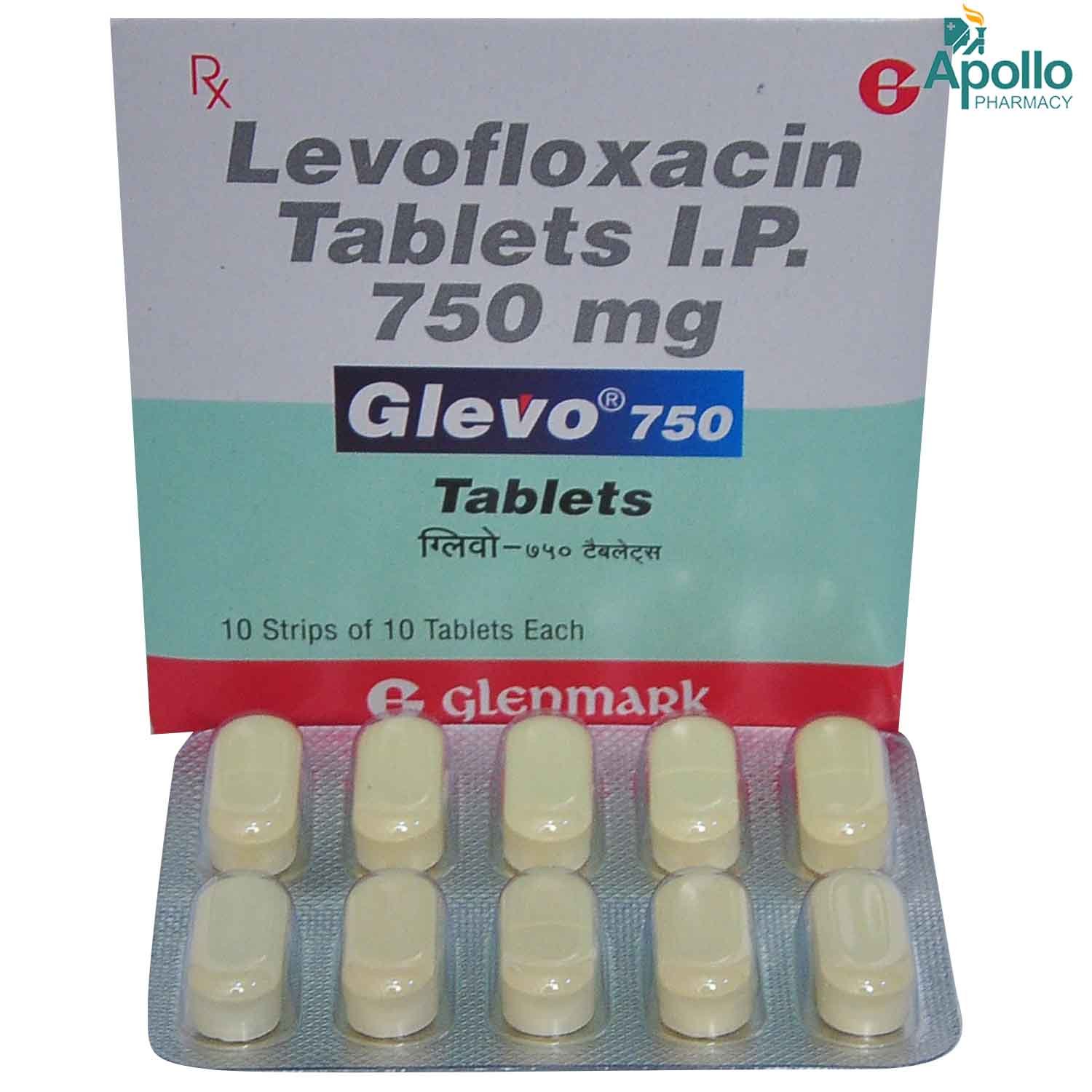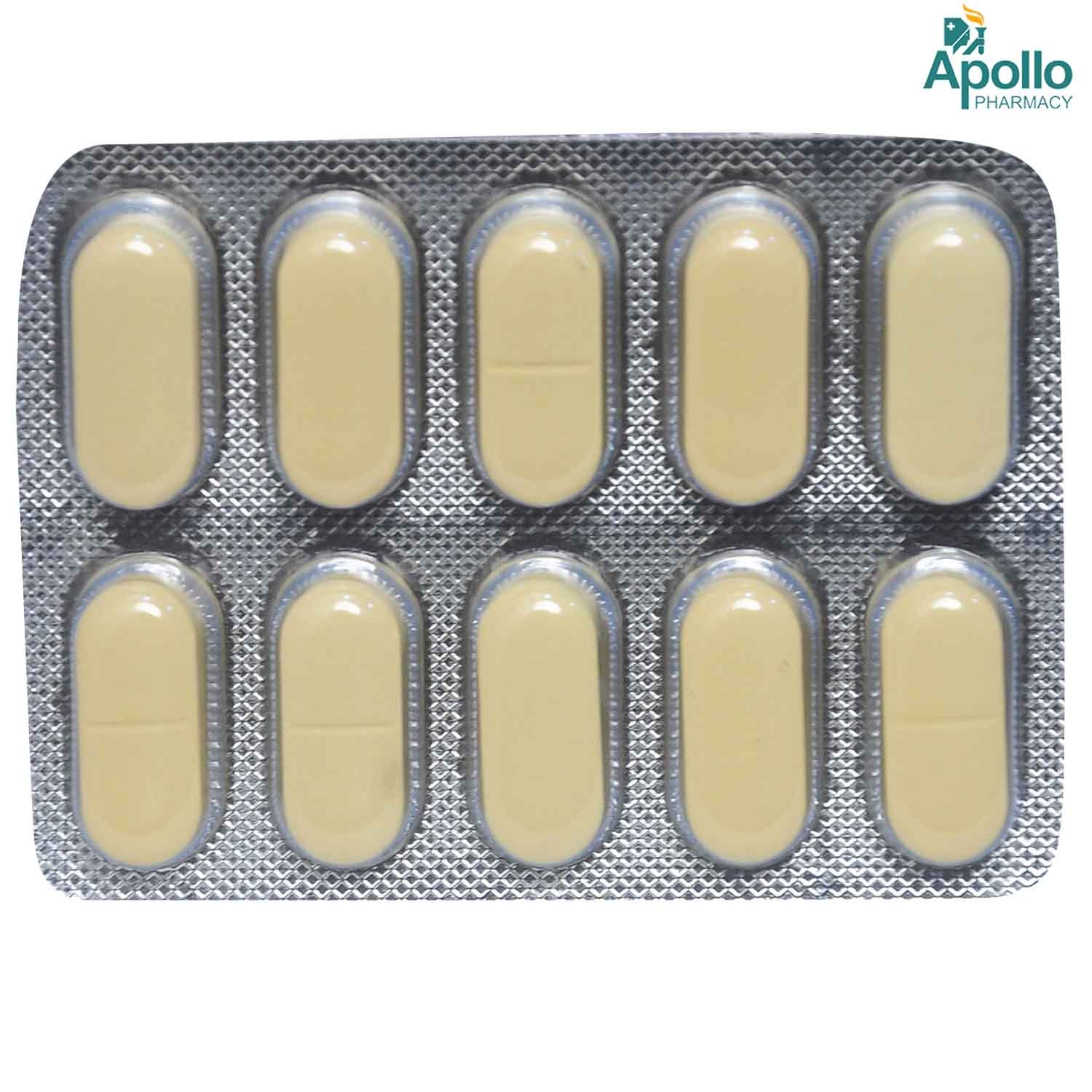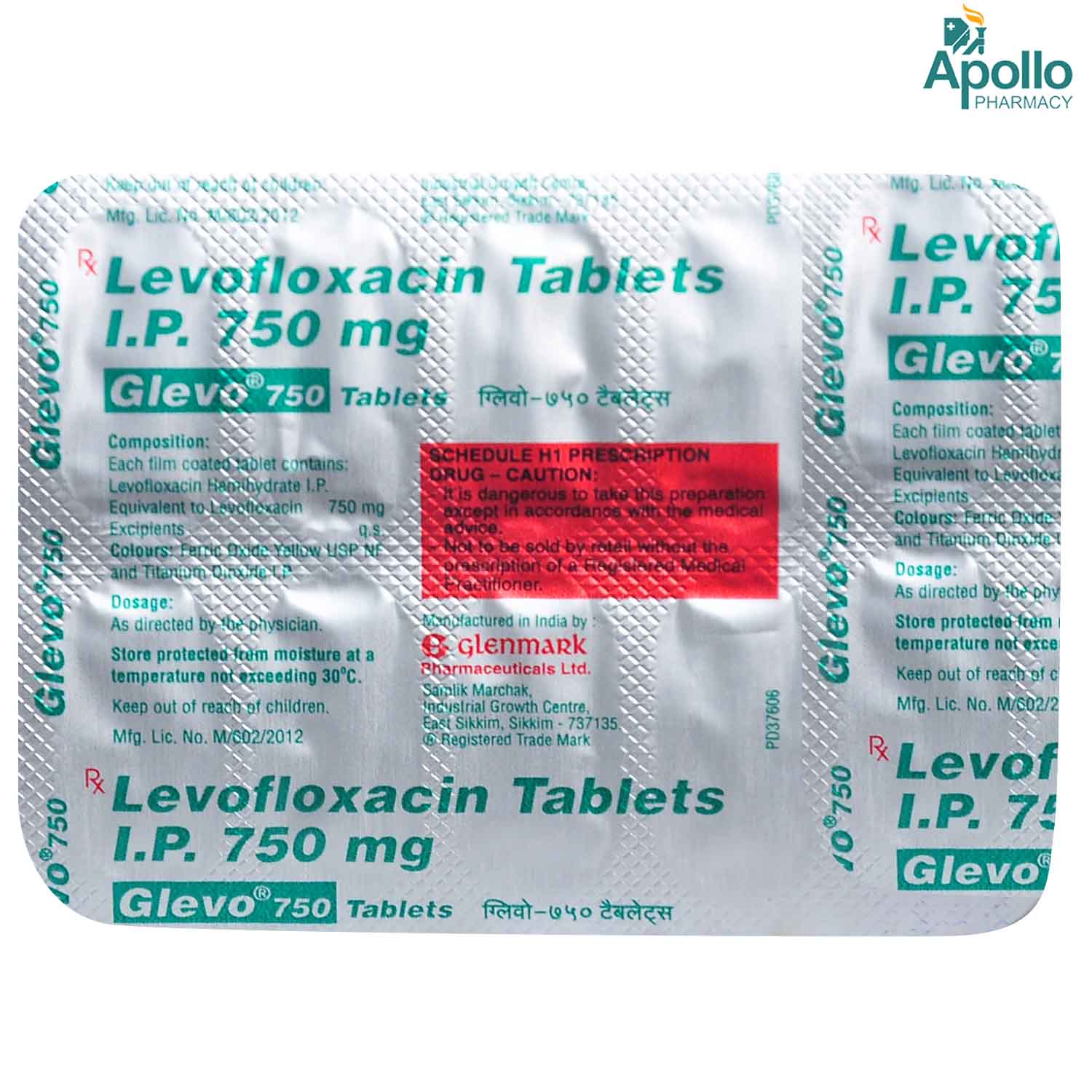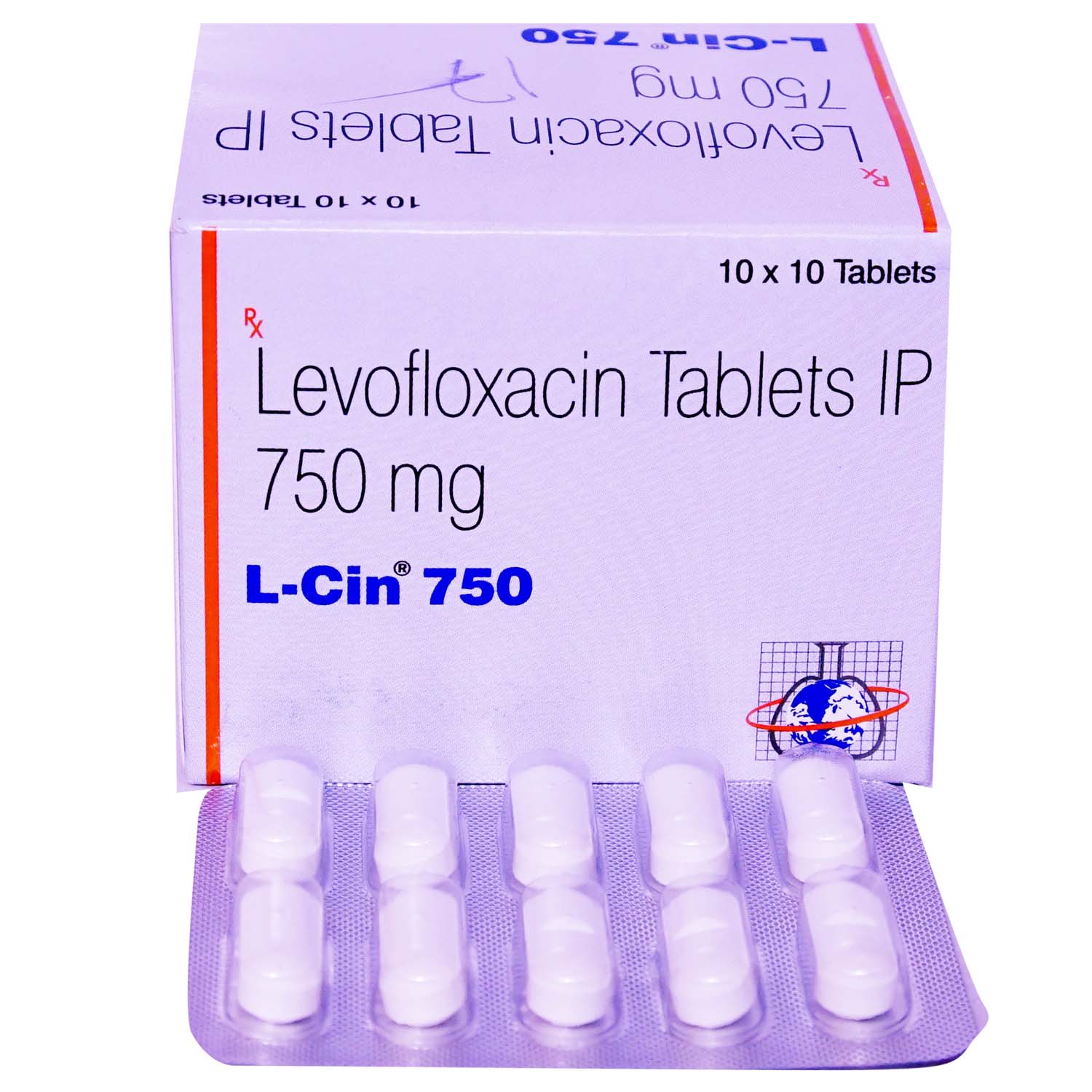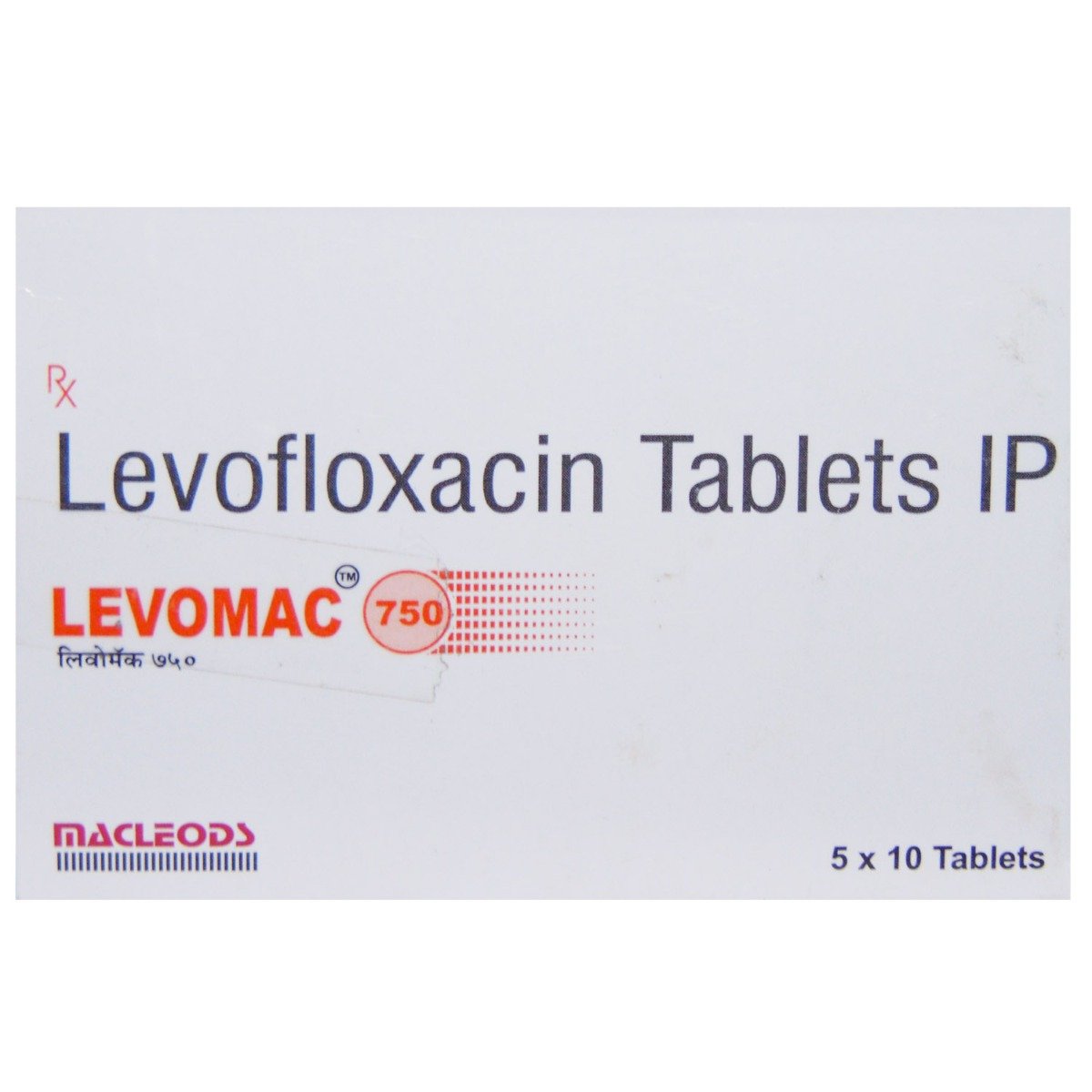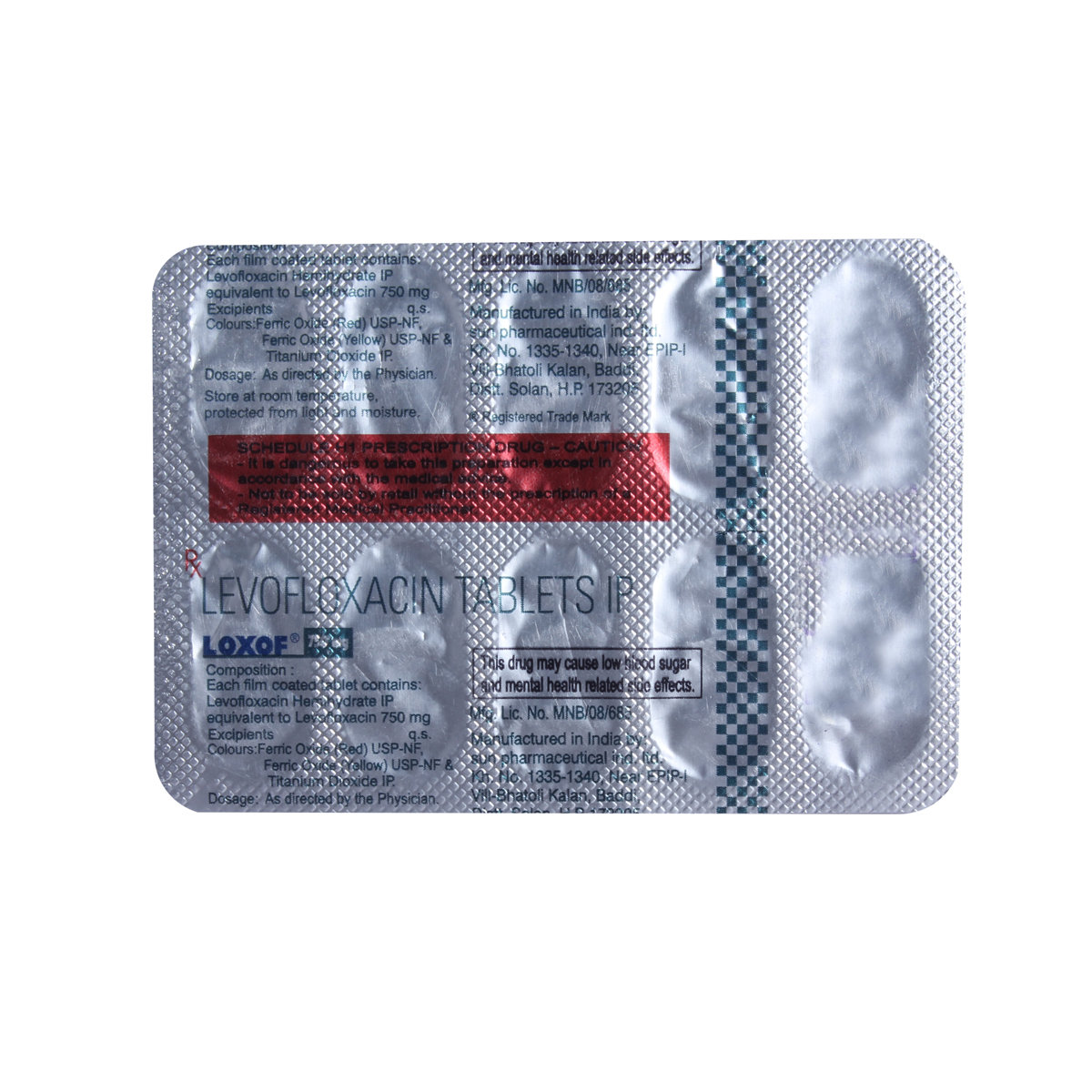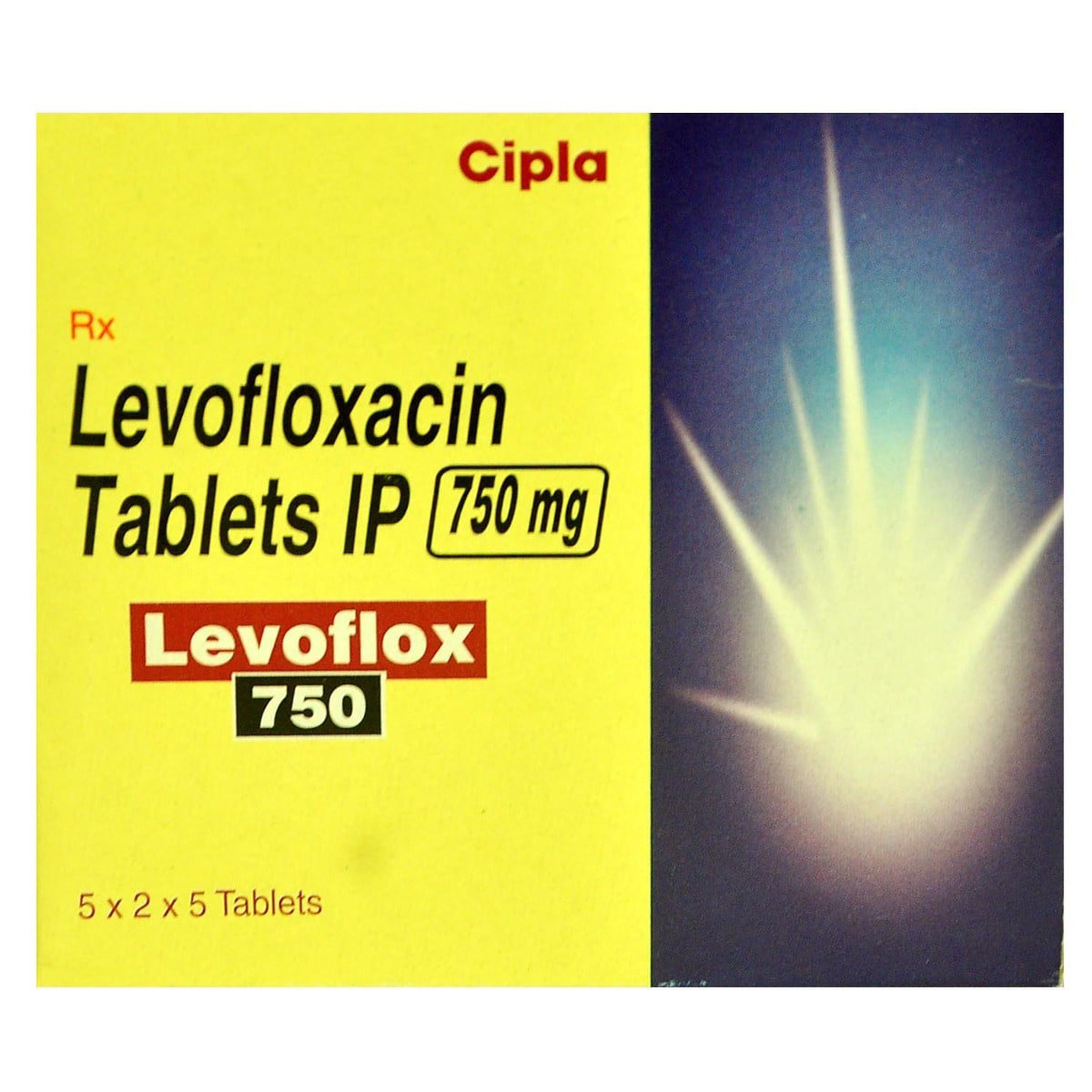Glevo 750 Tablet 10's
MRP ₹130.5
(Inclusive of all Taxes)
₹19.6 Cashback (15%)
Provide Delivery Location
Online payment accepted
 Prescription drug
Prescription drugWhats That
Composition :
Manufacturer/Marketer :
Consume Type :
Expires on or after :
Return Policy :
NPPA :
About Glevo 750 Tablet
Glevo 750 Tablet is an antibiotic that belongs to the third generation of fluoroquinolones. It is a highly effective antibiotic that works against a variety of bacteria. Glevo 750 Tablet is used in a variety of bacterial infections, most importantly acute pneumonia (Lung infection), bronchitis (Inflammation of lung passages), skin infections, as well as urinary tract infection. A bacterial infection is a condition in which bacteria grow in the body and cause infection. It can target any body part and multiple very quickly.
Bacteria that are dangerous can make you sick and replicate in your body quickly. Harmful bacteria create chemicals known as toxins that can harm the tissue and cause you sick. Glevo 750 Tablet sticks to enzymes (Topoisomerase IV & DNA gyrase) responsible for the division of bacteria & stop the process of multiplication of bacteria & hence kills bacteria.
The dose of Glevo 750 Tablet can vary depending upon your condition and the severity of the infection. Glevo 750 Tablet may cause common side effects like nausea, vomiting, indigestion, diarrhoea, constipation, trouble sleeping, and allergy. These side effects do not require immediate attention and resolve eventually. Nevertheless, if the side effects are persistent, contact your doctor.
Before starting Glevo 750 Tablet , please inform your doctor if you have any allergy (against any antibiotic), kidney or liver problems. Do not take Glevo 750 Tablet on your own as, self-medication may lead to antibiotic-resistance in which antibiotics fail to act against specific bacterial infections. And also, if prescribed by your doctor Glevo 750 Tablet is safe to use during pregnancy and breastfeeding.
Uses of Glevo 750 Tablet
Directions for Use
Key Benefits
Glevo 750 Tablet is an antibiotic that is used to treat bacterial infections resulting in pneumonia (Fluid build up in the lungs), urinary tract infection, bladder infection, prostate gland infection as well as skin infections. Glevo 750 Tablet inhibits the growth of bacteria that are then destroyed by the immune cells of our body. Glevo 750 Tablet also kills bacteria by disrupting their inner cellular contents thus fights infection, with lesser chances of causing bacterial resistance to it as compared to other antibiotics.
Storage
- Prepare for a restful night's sleep: Develop a calming pre-sleep routine, like reading or meditation, to help your body relax and prepare for sleep.
- Create a sleep-conducive Environment: Make bedroom a sleep haven by ensuring it is quiet, dark and calm.
- Follow a Sleep Schedule: Go to bed and get up at the same time every day to help regulate your body's internal clock and increase sleep quality.
- Try relaxing techniques like deep breathing, mindfulness meditation and any others.
- Limit stimulating activities before bedtime: Avoid stimulating activities before bedtime to improve sleep quality.
- Monitor Progress: Keep track of your sleep patterns to identify areas for improvement.
- Consult a doctor if needed: If these steps don't improve your sleep, consult a doctor for further guidance and therapy.
- Hydrate your body: Drink enough water to prevent dehydration and headaches.
- Calm Your Mind: Deep breathing and meditation can help you relax and relieve stress.
- Rest and Recharge: Sleep for 7-8 hours to reduce headache triggers.
- Take rest: lie down in a quiet, dark environment.
- Cold or warm compresses can help reduce tension.
- Stay Upright: Maintain good posture to keep symptoms from getting worse.
- To treat headaches naturally, try acupuncture or massage therapy.
- Over-the-counter pain relievers include acetaminophen and ibuprofen.
- Prescription Assistance: Speak with your doctor about more substantial drug alternatives.
- Severe Headaches: Seek emergency medical assistance for sudden, severe headaches.
- Frequent Headaches: If you get reoccurring headaches, consult your doctor.
- Headaches with Symptoms: Seek medical attention if your headaches include fever, disorientation, or weakness.
- Inform your doctor about dizziness symptoms. They may adjust your medication regimen or prescribe additional medications to manage symptoms.
- Follow your doctor's instructions for taking medication, and take it at the same time every day to minimize dizziness.
- When standing up, do so slowly and carefully to avoid sudden dizziness.
- Avoid making sudden movements, such as turning or bending quickly, which can exacerbate dizziness.
- Drink plenty of water throughout the day to stay hydrated and help alleviate dizziness symptoms.
- If you're feeling dizzy, sit or lie down and rest until the dizziness passes.
- Track when dizziness occurs and any factors that may trigger it, and share this information with your doctor to help manage symptoms.
- Inform your doctor about the nausea and discuss possible alternatives to the medication or adjustments to the dosage.
- Divide your daily food intake into smaller, more frequent meals to reduce nausea.
- Opt for bland, easily digestible foods like crackers, toast, plain rice, bananas, and applesauce.
- Avoid certain foods that can trigger nausea, such as fatty, greasy, spicy, and smelly foods.
- Drink plenty of fluids, such as water, clear broth, or electrolyte-rich beverages like coconut water or sports drinks.
- Use ginger (tea, ale, or candies) to help relieve nausea.
- Get adequate rest and also avoid strenuous activities that can worsen nausea.
- Talk to your doctor about taking anti-nausea medication if your nausea is severe.
- Record when your nausea occurs, what triggers it, and what provides relief to help you identify patterns and manage your symptoms more effectively.
- Take medications with food (if recommended): It can help prevent stomach distress and indigestion.
- Eat smaller, more frequent meals: Divide daily food intake into smaller, more frequent meals to ease digestion.
- Avoid trigger foods: Identify and avoid foods that trigger indigestion, such as spicy, fatty, or acidic foods.
- Stay upright after eating: Sit or stand upright for at least 1-2 hours after eating to prevent stomach acid from flowing into the oesophagus.
- Avoid carbonated drinks: Avoid drinking carbonated beverages, such as soda or beer, which can worsen indigestion.
- Manage stress: To alleviate indigestion, engage in stress-reducing activities like deep breathing exercises or meditation.
- Consult a doctor if needed: If indigestion worsens or persists, consult a healthcare professional to adjust the medication regimen or explore alternative treatments.
- Skin rash caused by allergies is due to irritants or allergens. Therefore, avoid contact with such irritants.
- Consult your doctor for proper medication and apply an anti-itch medication. Follow the schedule and use the medication whenever needed.
- Protect your skin from extreme heat and try to apply wet compresses.
- Soak in the cool bath, which gives a soothing impact to the affected area.
Drug Warnings
Drug-Drug Interactions
Drug-Drug Interactions
Login/Sign Up
The combination of Amiodarone and Glevo 750 Tablet may significantly raise the risk of an abnormal heart rhythm.
How to manage the interaction:
Despite the fact that Amiodarone and Glevo 750 Tablet interact, it can be taken if prescribed by a doctor. If you get dizziness, lightheadedness, fainting, or fast or racing heartbeats, consult a doctor. Do not stop taking any medications without visiting a doctor.
Taking Glevo 750 Tablet with Ziprasidone can increase the risk of abnormal heart rhythm.
How to manage the interaction:
Taking Glevo 750 Tablet with Ziprasidone is not recommended, but it can be taken together if prescribed by a doctor. However, consult your doctor if you experience sudden dizziness, lightheadedness, fainting, shortness of breath. Do not discontinue any medications without consulting a doctor.
Combining Glevo 750 Tablet with Disopyramide can increase the risk of irregular heart rhythm .
How to manage the interaction:
Taking Glevo 750 Tablet with Disopyramide is not recommended, as it can result in an interaction, it can be taken if your doctor has advised it. However, if you experience any symptoms like sudden dizziness, lightheadedness, fainting, or fast or pounding heartbeats, contact your doctor immediately. Do not discontinue any medications without first consulting your doctor.
Using sotalol together with Glevo 750 Tablet can increase the risk of an irregular heart rhythm that may be serious. The risk increases in patients with a history of heart illness or electrolyte imbalance.
How to manage the interaction:
Taking Glevo 750 Tablet with Sotalol is generally avoided as it can result in an interaction, it can be taken if your doctor has advised it. If you experience sudden dizziness, lightheadedness, fainting, or fast or pounding heartbeats, contact a doctor immediately. Do not discontinue any medications without consulting a doctor.
Coadministration of Glevo 750 Tablet with Haloperidol can increase the risk or severity of irregular heart rhythms. The risk increases in patients with a history of heart illness or electrolyte imbalance.
How to manage the interaction:
Taking Glevo 750 Tablet with haloperidol can result in an interaction, but it can be taken if a doctor has advised it. However, if you experience abrupt dizziness, lightheadedness, fainting, shortness of breath, or rapid heartbeat, get medical help immediately. Do not discontinue any medications without consulting a doctor.
Although it is a very rare adverse effect, taking Glevo 750 Tablet with vemurafenib increases the risk of an abnormal heart rhythm. If you're dealing with other heart illnesses, electrolyte imbalances (for example, magnesium or potassium loss likely due to serious or prolonged diarrhea or vomiting), you may be at greater risk.
How to manage the interaction:
Although concomitant administration of Glevo 750 Tablet with vemurafenib can possibly result in an interaction, it can be taken if your doctor has advised it. However, if you experience abrupt dizziness, lightheadedness, fainting, shortness of breath, or rapid heartbeat, get medical help immediately. Do not discontinue any medications without consulting a doctor.
Taking Glevo 750 Tablet with anagrelide increases the risk of an abnormal heart rhythm.
How to manage the interaction:
Concomitant administration of Glevo 750 Tablet alongside anagrelide can result in an interaction, it can be taken if a doctor has advised it. However, if you experience abrupt dizziness, lightheadedness, fainting, shortness of breath, or rapid heartbeat, get medical help immediately. Do not discontinue any medications without consulting a doctor.
Coadministration of Glevo 750 Tablet and Leflunomide can increase the risk of liver issues.
How to manage the interaction:
Although concomitant administration of Glevo 750 Tablet alongside leflunomide can result in an interaction, it can be taken if a doctor has advised it. However, if you have a fever, chills, joint pain or swelling, unusual bleeding or bruising, skin rash, itching, loss of appetite, fatigue, nausea, vomiting, abdominal pain, dark-colored urine, light-colored stools, and/or yellowing of the skin or eyes, contact the doctor right away. Do not discontinue any medications without consulting a doctor.
Coadministration of Glevo 750 Tablet and Pasireotide can increase the risk of an irregular heart rhythm.
How to manage the interaction:
Taking Glevo 750 Tablet with Pasireotide together can result in an interaction, but it can be taken if a doctor has advised it. If you have any symptoms like an irregular heartbeat, dizziness, fainting, or trouble breathing, you should call a doctor right away. Do not stop using any medications without talking to a doctor.
Using dofetilide together with Glevo 750 Tablet can increase the risk of an irregular heart rhythm.
How to manage the interaction:
Although there is a possible interaction between Glevo 750 Tablet and Dofetilide, you can take these medicines together if prescribed by a doctor. If you experience symptoms like an irregular heart rhythm, dizziness, fainting, or shortness of breath, it's important to call a doctor right away. Do not stop using any medications without a doctor's advice.
Drug-Food Interactions
Drug-Food Interactions
Login/Sign Up
Diet & Lifestyle Advise
- Dairy products such as milk and yogurt must be avoided for at least 2 hours before and after taking the medicine.
- Maintaining good hygiene is essential.
- Have more fiber-enriched food in your diet, as it can be easily digested by your gut bacteria, which helps stimulate their growth. Thus, fiber-rich foods may help restore healthy gut bacteria after a course of antibiotics.
-
After taking the full course of levofloxacin, probiotics should be taken in order to recover healthy bacteria that could have been destroyed in the intestines. The risk of antibiotic-associated diarrhea by antibiotic treatment can be minimized by taking probiotics.
Side Effects of Glevo 750 Tablet
- Nausea
- Vomiting
- Diarrhoea
- Constipation
- Indigestion
- Trouble sleeping
Habit Forming
Therapeutic Class
All Substitutes & Brand Comparisons
RX
Out of StockNot for online saleAgilevo 750mg Tablet
Agio Pharmaceuticals Ltd
₹80.56
(₹7.25 per unit)
38% CHEAPERRX
Out of StockNot for online saleHileflox 750mg Tablet
Higlance Laboratories Pvt Ltd
₹50.25
(₹9.04 per unit)
23% CHEAPERRX
Out of StockNot for online saleAnkaxin 750mg Tablet
₹106
(₹9.54 per unit)
18% CHEAPER
Author Details
We provide you with authentic, trustworthy and relevant information
Drug-Diseases Interactions
Drug-Diseases Interactions
Login/Sign Up
FAQs
Drug-Drug Interactions Checker List
- SUCRALFATE
- THEOPHYLLINE
- CIMETIDINE
- PROBENECID
- CYCLOSPORINE
- INSULIN
- WARFARIN
- GLIBENCLAMIDE
Special Advise
Before starting Glevo 750 Tablet treatment a patient should take care of the following points :
- During treatment and after 48 hours of discontinuation of treatment with Glevo 750 Tablet , limit exposure to heavy sunlight or to artificial UV rays (e.g. sunlight).
- Before using eye drops of Glevo 750 Tablet , remove the contact lenses and wait at least 15 minutes before reinsertion.
- Monitor liver function test (LFT), renal function test, white blood cell count, and blood glucose level in diabetic patients as Glevo 750 Tablet may cause harmful interactions in these patients.
Disease/Condition Glossary
A bacterial infection is a condition in which harmful bacteria enter, multiply, and infect our bodies. It can target any body part and multiple very quickly. When you get infected with bacteria, you can experience generalized symptoms like fevers, chills, and fatigue. Bacteria are of various forms comprising commonly of spherical, rod, and spiral-shaped. Bacterial infections vary from minor illnesses like sore throat and ear infections to severe brain infections like meningitis and encephalitis. Few harmful bacteria that cause infections include Streptococcus, Staphylococcus and E. coli. Anyone can become infected with a bacterial infection. People with weak immune systems or taking immunosuppressive medicine can make them more prone to bacterial infection.

Have a query?
Alcohol
Safe if prescribed
Alcohol is not known to cause any unpleasant side effects if taken along with Glevo 750 Tablet . But intake of alcohol with Glevo 750 Tablet may damage your liver. So intake of Glevo 750 Tablet should be avoided with Glevo 750 Tablet .
Pregnancy
Consult your doctor
It is not known whether Glevo 750 Tablet will affect pregnant women or fetus or not. Hence, the intake of Glevo 750 Tablet should be avoided if you are pregnant or planning to become pregnant unless your doctor recommends otherwise.
Breast Feeding
Consult your doctor
Before taking this drug doctor's consultation is mandatory.Glevo 750 Tablet is excreted in human milk. But the amount of Glevo 750 Tablet absorbed by the nursing infant is unknown.
Driving
Safe if prescribed
After taking this drug, you can experience side effects like feeling dizzy, tired, and a spinning sensation (vertigo) or alterations in your vision. If this occurs, do not drive or perform any work that requires high level of concentration.
Liver
Consult your doctor
Glevo 750 Tablet to be taken with caution, especially if you have a history of liver diseases/conditions. The dose may have to be adjusted by your doctor.
Kidney
Consult your doctor
Glevo 750 Tablet to be taken with caution, especially if you have a history of Kidney diseases/conditions. The dose may have to be adjusted by your doctor.
Children
Safe if prescribed
Glevo 750 Tablet can be given to children but under medical supervision. Glevo 750 Tablet is prescribed to the children to treat complicated urinary tract infections, anthrax infection or plague infection.

